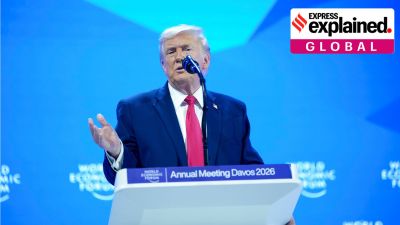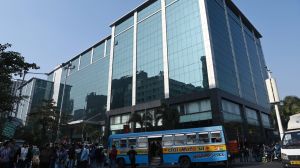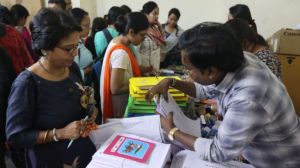7 Year Itch
8226; Two major successes8212;Hum Tum and Dhoom8212;in one year and a third movie, Veer-Zaara, on its way. How does it feel having hits y...

 8226; Two major successes8212;Hum Tum and Dhoom8212;in one year and a third movie, Veer-Zaara, on its way. How does it feel having hits year after year?
8226; Two major successes8212;Hum Tum and Dhoom8212;in one year and a third movie, Veer-Zaara, on its way. How does it feel having hits year after year?
I feel scared every single time and I say this without the slightest exaggeration. It is all the blessings of the almighty. I8217;m fortunate to be connected to a medium I enjoy.
8226; There has to be some secret formula that the Chopras have mastered. What do you think it is? I don8217;t think any such formula exists besides passion. On my part, I can say that there has been extreme discipline and honesty in purpose. We made films because we saw potential in them to work. And this transparency in intention is reflected in the product.
8226; After so many films, how does one remain objective about one8217;s work? There is an art to watching a film, but this art mysteriously deserts you when you are watching your own creation. I8217;m less attached to the films I produce but I cannot be objective about the ones I direct. Film-makers all over the world, I8217;m sure, feel the same way. But despite the underlying web of emotions, there is a method to check that you are on the right track. The barometer varies from project to project. Sometimes something clicks during a story narration, sometimes during the process of shooting, and sometimes while watching the final print, an inner voice always warns you.
8226; What does the inner voice say about Veer-Zaara?
The inner voice guides me on creativity, not commercial faring. It tells me that I8217;ve given my best shot. I8217;m satisfied. I have no regrets.
8226; What role has son Aditya Chopra played in the growth of your banner?
When I launched the banner many years ago, I lent it my passion, credibility and stability. Three decades later, my son lends it his modern vision and vast knowledge of technology. We have different styles of working but we work well creatively. On the administrative front, not just us, but the entire staff has clearly demarcated duties to avoid confusion.
8226; And how do you divide duties between your son and yourself?
I concentrate on the distribution offices everywhere. The music company and studio need more attention because they are still new firms. Adi takes charge of film production8212;everything from the concept to the marketing and exhibition. It was my idea that he launch his own production company. He works so hard, he deserves a separate title. So after much resistance, he agreed. Hum Tum and Dhoom are Aditya Chopra productions, which is a part of Yash Raj Films. I remain the presenter of all films produced under the banner, his as well as mine.
8226; What happens when there is a conflict of interest or ideology?
Conflict is necessary for growth. We disagree on several issues but because we live in the same house, we have ample opportunity to ventilate our point of view. To be honest, I had not initially expected either Hum Tum or Dhoom to work. In the final print, I was more positive, but Adi was convinced that the novelty was in the attitude. He was so self-assured that I trusted his conviction.
| nbsp; | Adi was present all the time on the sets, so I could not in the slightest way alter his lines. In the past, none of my writers has ever been on my sets during shooting. That was the biggest difference |
8226; Any other times when you were apprehensive and he convinced you?
Dil To Pagal Hai was his concept and title. Originally, we were to make Maine To Mohabbat Ki. Adi felt the story was reminiscent of a vintage romance and not in keeping with the times. He suggested we postpone the shooting dates while he reworked the story. We agreed and that was fruitful.
8226; When Aditya was launched as a director, his Dilwale Dulhaniya Le Jaayenge DDLJ resembled Yash Chopra classics. Then Yash Chopra8217;s Dil To Pagal Hai resembled Aditya8217;s debut. And later, his Mohabbatein had echoes of your Deewar.
When Aditya made his debut as a director, I opted to be the production controller because I wanted to make sure nothing went wrong on the sets. My contribution as a producer was 100 per cent but as a creative person, zero. DDLJ was solely Aditya8217;s baby. Today, when I8217;m making my lavish film Veer-Zaara, it8217;s as if my son and I have reversed roles. He is the producer as well as my first assistant. He says, 8216;Papa, whatever you need, just ask. You don8217;t have to go for location and prop hunting. It will be made available to you on your desk, in your air-conditioned cabin8217;.
8226; Would you say that cinema has changed a lot in recent years?
I don8217;t think so because my banner has always remained active. It was systematic even in the days when I assisted my brother BR Chopra. Bhaisaab was an extremely organised worker. Today, there is greater discipline on the sets and technology is a great facilitator. The younger generation does not leave anything to chance.
8226; Isn8217;t it unusual that someone as young as Aditya should feel inspired to write a love story set in Pakistan?
When we were planning the film, he was adamant that I should not set one more love story in urban India or abroad. Then one day, when my wife Pam, daughter-in-law Payal and I were in the room, he announced he had an idea. He said he8217;d narrate two scenes to us and depending on our response, we could take it further. The two scenes were engrossing. He asked for one month, and said he would be ready with the first draft of the screenplay. A month later, he narrated the story and all of us were convinced that it was the right subject.
8226; How much was the decision influenced by the recent thaw in Indo-Pak ties?
I have read in the papers that my film was conceived to facilitate Indo-Pak relations, but there is no truth to these stories. My film does not propagate war, religion or the pain of Partition. There is an inherent drama in the film provided by the locales, which inadvertently defines its tone. The music and the moments are different from those in my earlier films.
8226; This is the first time you are working with a writer who is not just your son, but also your chief assistant. Does that get claustrophobic?
He was present all the time on the sets, so I could not in the slightest way alter his lines. In the past, none of my writers8212;Salim Javed, Rahi Masoom Reza or Javed Siddiqui8212;has ever been on my sets during shooting. That was the biggest difference. Adi is a very organised worker. He is willing to work on the scenes as many times as you desire, provided you approve before going on the sets. Once there, he will not allow any afterthoughts. To be fair to him, it was equally trying for him. This was the first time he had to part with his screenplay to a director whom he could not overstep8212;his father.
8226; You are back after a long break. Didn8217;t you miss it?
I did. It has been seven years since the release of Dil To Pagal Hai and eight years since I shot it. That8217;s why I8217;m all the more nervous. After all, you cannot measure expectations, just as you cannot measure emotions.
| nbsp; | I8217;m still emotional about Mughal-E-Azam, but to expect that just because one8217;s favourite vintage car is going to be on the road, no other car should drive on the highway is not fair |
8226; Any truth to the rumours that you did not consider Aishwarya Rai because of her fallout with Shah Rukh Khan?
I don8217;t indulge in such stories. I signed Aishwarya soon after she won the Miss World title, but have not been able to use her since. Adi used her very briefly in Mohabbatein but my commitment to casting her is yet to be realised. There are absolutely no problems between us and we will work together as soon as I find the right role for her.
8226; What is it about you that competitive stars agree to be part of your project?
8226; Eleven years ago, you launched Shah Rukh Khan on his route to success. Today, he is a raging superstar. Have the equations between you altered?
Eleven years ago, he did Darr because he wanted to do something different. He didn8217;t even hear my story. On the contrary, he narrated to me his other negative roles so that there would be no overlap in the films. Today, Shah Rukh does films with my banner because he has bonded with us as a family. He still does not listen to the subject. He says he trusts Adi and me. He never discusses payment; he says, 8216;give what you want8217;.
8226; How much has he transformed over the years as an actor and as a person?
His stardom is indisputable, and overseas, he is an even bigger draw than in India. As an actor, he has surpassed himself in Veer-Zaara. His detractors will not find any residue of the old image. As a person, he has been completely transformed by his children. He is a great dad and obsessed with spending quality time with his kids. Before confirming dates to any producer, he first checks his children8217;s calendars.
8226; For someone who has grown up on a classic like Mughal-E-Azam, how does it feel to share a release date?
My release date was confirmed irrespective of who was releasing their film on that day. After 44 years, I still feel emotional about Mughal-E-Azam like everyone else of my generation. But to expect that just because one8217;s favourite vintage car is going to be on the road, no other car should drive on the highway is not fair. There are four releases this Diwali, as on many holidays. I8217;m sure everyone will find sufficient audiences.
8226; The Dadasaheb Phalke Award, a rocking banner, so many titles and so many hits. What more does Yash Chopra want?
More films, I guess. Over here, you are judged by your success, not good films.
8226; How is Veer-Zaara in your estimate?
Aditya8217;s work is extraordinary. Just like Deewar cannot be mentioned without crediting the dialogues, Veer-Zaara cannot be appreciated without acknowledging the dialogues. Because he is my son, I cannot take the credit away from him.
8226; Aren8217;t you underplaying your contribution to the film?
I wouldn8217;t do that. In all modesty, I8217;d say that I have enhanced his script.
Bhawana Somaaya is the editor of Screen magazine. Read the complete interview in this week8217;s issue of Screen
- 01
- 02
- 03
- 04
- 05































